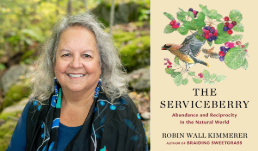- Categories:
A Q&A with Robin Wall Kimmerer, Author of December Indie Next List Top Pick “The Serviceberry”
- By Zoe Perzo
Independent booksellers across the country have chosen Robin Wall Kimmerer’s The Serviceberry (Scribner) as their top pick for the December 2024 Indie Next List.

Using the serviceberry as an example, Kimmerer explores the benefits of a system based on reciprocity rather than hoarding resources.
“Don’t let the size of this book fool you! It’s brimming with nuggets of wisdom regarding our relationship to the natural world and pleas for reciprocity in all aspects of living. A wonderful reference for a more equitable, meaningful existence,” said Debra Horan of Booklovers’ Gourmet in Webster, Massachusetts.
Here, Robin Wall Kimmerer discusses her work with Bookselling This Week.
Bookselling This Week: The Serviceberry is an excellent reminder that our current systems are not the only possible systems. How did you decide on this tree, the serviceberry, as the focus for this piece?
Robin Wall Kimmerer: Serviceberry is a model of interdependence. It doesn’t hoard what it has, it’s not wealthy because of what it possesses, but because of what it shares. Serviceberry can’t thrive without nurturing a relationship with the birds and bees. They remind us that we’re all better off when we foster bonds with each other and share what we have with the human and more-than-human communities that surround us. Also, its name connects to the idea of economies as a way to provide the “goods and services” for the community.
BTW: In this book, you blend ecology, anthropology, etymology, and economics, as well as your personal experience. What did the creation process look like for this book?
RWK: We exist within an economic system that actively harms what we love. Yet there are small communities all around us that are creating a countercurrent to this. Part of my job with this book was to open up my awareness to all of the gift economies that exist around me and to shine a light on them for readers. I’m so struck in particular by the generosity and creativity of the living world.
There are small and generative communities creating alternatives to our extractive and corrosive market economy. The creation of this book reminded me that not only is another way of life possible for us, it already exists in patches. There’s a growing understory of communities that stand ready to replace a system that seems destined to fail.
BTW: What other titles, resources, or groups would you recommend to readers who really resonated with this book, and with the ideas of a more sustainable and ethical economy based on reciprocity?
RWK: There are a number of brilliant folks who are helping us to build more satisfying futures. Kate Raworth and her book Doughnut Economics is a wonderful example of this. She’s an Oxford-based economist who has written that our flourishing relies on meeting more than just basic physical needs, that we need equality, a sense of community, and mutual support as well. I’d also highlight the work of Janine Benyus and her book Biomimicry. Her insights guide us towards new economic models, based on nature.
BTW: Would you tell us a bit about the role of books and indie bookstores in your life?
RWK: At the moment I’m struck by the idea of reading as a place where we can move consciousness. We need to move towards a culture that allows for mutual flourishing, and reading is a place where we can be inspired to change our minds and change how we act. That’s how the world changes.
Indie bookstores are crucial wellsprings for the health of our democracy. I see them as places that nurture community and our connection to each other, where books aren’t merely commodities but the meeting point for two minds.
I’d be remiss if I didn’t mention how grateful I am for the support of indie booksellers. I am so thankful for everything they did to introduce readers to Braiding Sweetgrass and for the honor of choosing The Serviceberry as their #1 selection this month.

